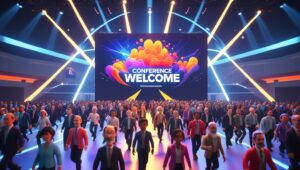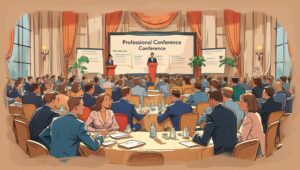What role does literature play in shaping society? From uncovering hidden histories to inspiring social change, literature is one of humanity’s most powerful tools of expression. A Literature Conference provides the perfect platform to celebrate these contributions while opening new conversations about language, culture, and creativity.
In today’s digital age, where storytelling spans from books to AI-generated narratives, literature conferences help scholars, professionals, and creators stay connected, share insights, and build global collaborations. For academics, journalists, authors, and event organizers, these conferences are not only gatherings but also cultural milestones.
What is a Literature Conference?
A Literature Conference is an academic and professional event where participants explore literary works, theories, and cultural perspectives. These conferences often include:
- Research presentations on classical and modern literature.
- Panel discussions on cultural theory, identity, and creative writing.
- Workshops for writers, critics, and educators.
- Networking sessions for publishers, journalists, and media professionals.
👉 Beyond scholarly exchange, literature conferences foster cross-cultural understanding and celebrate the power of storytelling.
Why Attend a Literature Conference?
1. Academic Recognition
Researchers gain visibility by presenting papers, publishing work, and engaging in literary debates.
2. Professional Growth
Speakers and professionals expand their profiles by sharing insights and discovering emerging literary trends.
3. Networking Opportunities
Conferences attract authors, scholars, publishers, media professionals, and event planners, providing unmatched networking opportunities.
4. Global Cultural Exchange
Engage in discussions that explore world literature, comparative studies, and translation across diverse languages.
5. Creative Inspiration
For writers, literature conferences spark new ideas, writing approaches, and collaborations.
Key Themes at Literature Conferences
Literature is ever-evolving, and so are the conference themes. Common topics include:
- World Literature & Comparative Studies – Understanding literature across cultures.
- Postcolonial & Gender Studies – Examining literature through critical theory.
- Digital Literature & Storytelling – Exploring how technology reshapes narratives.
- Translation & Global Publishing – Bridging language and cultural barriers.
- Creative Writing & Poetry – Showcasing the artistry of modern storytelling.
These diverse themes ensure that each Literature Conference remains inclusive, innovative, and relevant.
Who Should Attend a Literature Conference?
The audience for literature conferences includes a mix of scholars, creators, and media:
- Academics & Researchers – Present papers and collaborate across literary fields.
- Professionals & Industry Experts – Apply literary theory to media, publishing, and culture.
- Event Organizers & Planners – Host conferences that foster global engagement.
- Speakers & Thought Leaders – Share insights that shape the future of literature.
- Journalists, Bloggers & Media – Report on trends, discussions, and global literary voices.
Notable Literature Conferences
Here are some of the leading global events to watch:
- International Conference on World Literature & Cultural Studies
- Focus: Comparative literature, global narratives, and cultural intersections.
- Audience: Academics, scholars, and cultural critics.
- Annual Conference on Creative Writing & Storytelling
- Focus: Fiction, poetry, and digital narratives.
- Audience: Authors, students, and educators.
- Global Symposium on Literary Translation & Publishing
- Focus: Translation studies and international publishing trends.
- Audience: Translators, publishers, and journalists.
- International Conference on Literary Theory & Critical Studies
- Focus: Gender studies, postcolonialism, and contemporary criticism.
- Audience: Academics, researchers, and thought leaders.
How to Make the Most of a Literature Conference
To maximize your experience, consider these tips:
- Prepare Early: Review the schedule and select panels most relevant to your goals.
- Engage in Q&A Sessions: Build visibility by asking thoughtful questions.
- Network Across Fields: Connect with publishers, authors, and journalists.
- Take Notes: Document key insights to apply in your research or creative work.
- Follow Up: Strengthen professional ties through post-conference communication.
FAQs About Literature Conferences
1. What is the purpose of a Literature Conference?
To explore research, cultural perspectives, and creative writing across diverse traditions.
2. Who can attend?
Academics, students, authors, journalists, and literary enthusiasts.
3. Do I need to present a paper to attend?
No. Many participants attend to listen, learn, and network.
4. What benefits do attendees gain?
Networking, publication opportunities, global exposure, and creative inspiration.
5. How can I find upcoming events?
Check academic event directories or visit Conferences Daily.
Conclusion: Shaping the Future of Literature Together
The Literature Conference is more than a gathering of scholars—it is a celebration of words, ideas, and cultural dialogue. By uniting academics, writers, publishers, and media experts, these conferences foster meaningful connections and ensure literature continues to evolve as a force of creativity and change.
👉 Don’t miss the chance to join the global literary community. Explore upcoming events at Conferences Daily.















